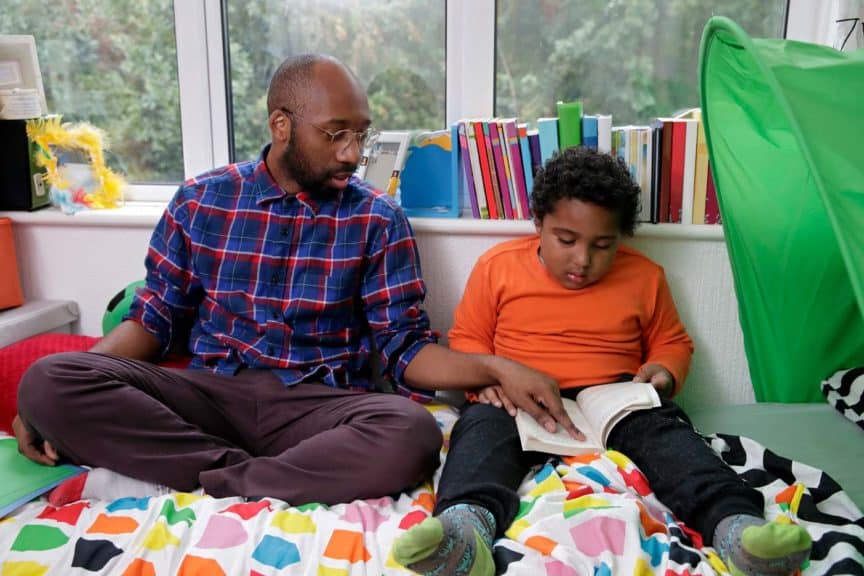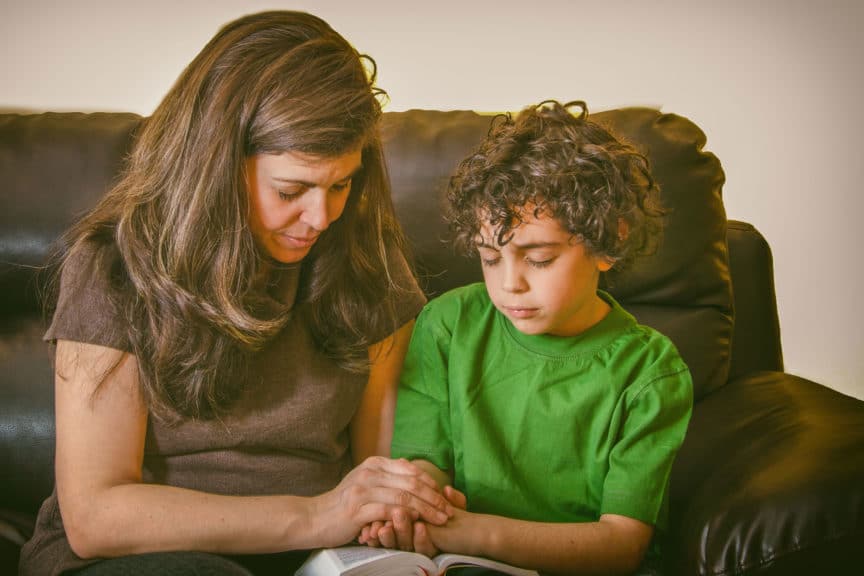One of the most awesome responsibilities of the teacher at church is to give children the tools of prayer. Even young children can approach their heavenly Father with the confidence that He hears their prayers.
It’s never too soon for any one of us to establish a habit of daily prayer.
Children can talk to God about anything and everything.
What to Teach About Prayer
God Listens
Children may feel that they are too young or insignificant for God’s attention, or that God is only interested in grownups. Assure children that God cares and wants to hear from them at any time (see Matthew 7:7-8). They are important to Him!

Some children may feel that when they pray, they must feel or express deep emotions. Let your children know that God hears, even if they don’t feel like anything happened! They can talk to Him about anything and everything.
God Provides
God is the source of everything on earth. Children can give prayers of thanksgiving for food, shelter, clothing, friends, family, and safety (see Psalm 103:1-5). They can rest in knowing that He cares for them.
God Is Not a Magician or Santa Claus
Prayer is often seen as something magical that grants instant requests. A child may feel sad or angry when a prayer did not “come true” right away. Sometimes prayers are answered after a long time. For example, a chemistry set is a great birthday present, but a very young child would not be able to use it. The child would need to get older and learn more before using it. Sometimes God waits for children (and adults!) to mature before answering a prayer.
It’s important for children to learn that even though we may not feel it, God’s timing is perfect.
People commonly pray when they want something. Children often pray to get certain gifts for Christmas or that their team will win the championship. Sometimes God answers prayer not by giving us what we want but by giving the strength and wisdom to work for what we want. A child who works hard to earn an allowance can save money for a bike. A team can win a championship with practice and good sportsmanship.
God moves in really cool ways, so we have to be on the lookout for the opportunities He gives us.
Reassure children that God wants them to pray about all their needs and concerns, and that they can depend on God to love and care for them always (see Philippians 4:6).
God moves in really cool ways, so we have to be on the lookout for the opportunities He gives us.
God Likes to Hear Prayers for Others
Besides praying for their own needs, encourage children to think about and then pray for the needs of others. Children can pray for their parents, siblings, friends, schoolmates, teachers, pets, and even those they don’t agree with (see Matthew 5:44; Ephesians 6:18; James 5:16).
It will help them focus on the needs of others and see how God is moving in and for each of us!


Why Didn’t God Answer My Prayer?
In an imperfect world, bad things happen. A child can be caught in an ugly custody battle during a divorce. A child may be the victim of abuse or a criminal act. Natural disasters and accidents can destroy a family home. A family member or favorite pet may die. Children may wonder why a caring God would allow things to happen that they consider tragic.
Reassure the children you lead that God understands how they feel and that He can make something good come out of a bad situation (see Romans 8:28). For example, when a disaster happens, people in a church or community often help each other. God is still present and working through these people to see that needs are met.
God wants us to come to Him as we are!
How to Pray
Keep It Simple
Children may feel that they need poetic language and “thees and thous” to pray. Children can talk to God in ordinary language! He wants us to come to Him as we are! Avoid certain things when teaching kids to pray.
Keep It Honest
Children may feel that God will punish them if they are angry, upset, or doubtful. It’s okay to talk to God about unhappy feelings. God wants to hear how they feel. He’s the best kind of friend.

Keep It Short
Prayers don’t need to be long or cover every subject. Young children can begin with short sentence prayers as they learn to pray.
Be a Role Model
Children will become comfortable with prayer when they see adults praying in ways that are appropriate and appealing. Make prayer a regular part of your class. Talk about personal answers to prayer during class (and pray for the kids in your ministry outside of class too).
Use a Simple Format
ACTS is a common acrostic you can use to teach children how to pray.
- Adoration: Praise and thank God for His love and power.
- Confession: Admit actions and attitudes that do not show love for God and others, and say, “I’m sorry” for sins.
- Thanksgiving: Thank God for the good things He gives us.
- Supplication: Ask God for things you need.
Keep a Prayer Journal
Older children can write down their petitions, thanksgivings, and answers to prayer. They can record Scripture that they prayer through. Lead children to make prayer journals by decorating a notebook or attaching sheets of paper together with a ribbon and cardboard cover. Prayer journals may be kept as personal, not to be read by other students.










